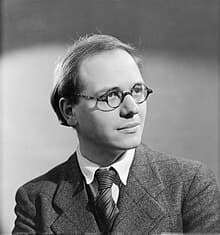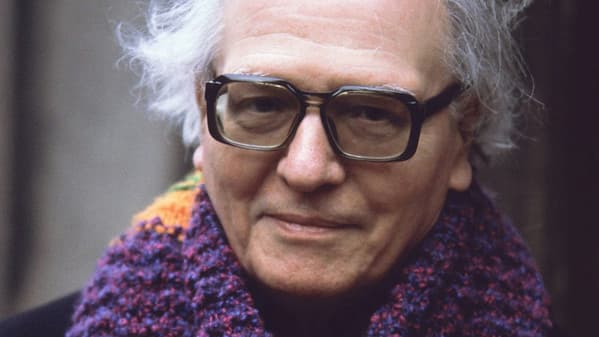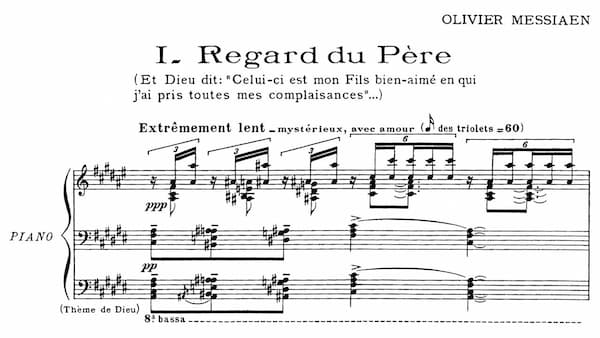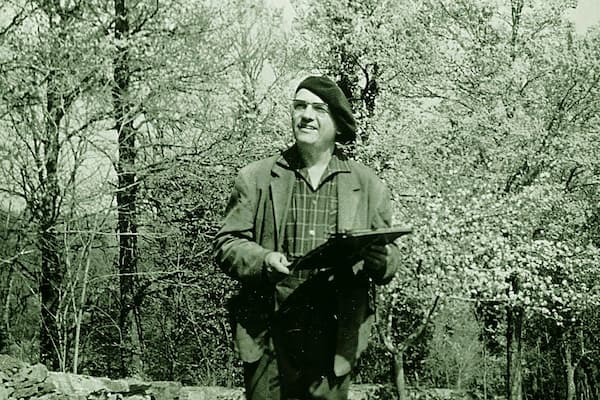I’ve always felt Olivier Messiaen (1908–1992) was something of a “Marmite composer”: you either love his music or you don’t.

The young Messiaen, 1937
It’s not the easiest music to listen to. I remember playing one of the movements from Messiaen’s extraordinary Vingt Regards sur l’enfant Jesus to one of my piano students, who said it “sounded like something from a horror movie!”. And after playing it at a performance platform for adult amateur pianists, one of the hosts told me in no uncertain terms: “I hated it!”.
I admit it took me a while to get to know and appreciate his music, in particular the piano music. My first up-close and personal encounter was at a piano course where one of the participants played the fourth movement of the Vingt Regards – Regard de la vierge. To be that close to the music, both in terms of hearing it and seeing it on the page, was a revelation for me, and I decided there and then that I too would learn this piece (it formed part of my first diploma programme).
Messiaen’s music is deeply influenced by his passions: his deep Catholic faith, his love of birdsong, and his fascination with rhythm and harmony. His sound is far from conventional, but it offers a rewarding journey into a world of vivid colours, spiritual devotion, and nature’s beauty.
Here are six pieces to introduce his piano music and his distinct soundworld:
La Colombe (‘The Dove’) from Huit Preludes

Olivier Messiaen
The influence of Debussy is evident in Messiaen’s preludes, composed in the late 1920s, when the composer was just 20. Yet there are hints of what was to come later, particularly in the unusual, shimmering harmonies.
Olivier Messiaen: Preludes: No. 1. La colombe (The Dove) (Pierre-Laurent Aimard, piano)
Rondeau
A witty piano miniature which also displays the influence of Debussy.
Olivier Messiaen: Rondeau (Kyoko Hashimoto, piano)
Regard du Père from Vingt Regards

Messiaen’s Regard du Père
The first movement of Messiaen’s monumental Vingt Regards, this is hypnotic and meditative, full of the composer’s distinctive harmonies and moments of spiritual ecstasy.
Olivier Messiaen: 20 Regards sur l’Enfant-Jésus – No. 1 Regard du Père (Bertrand Chamayou, piano)
Je dors, mais mon coeur veille from Vingt Regards
By turns tender and ecstatic, this is the 19th movement of the Vingt Regards.
Olivier Messiaen: 20 Regards sur l’Enfant-Jésus – No. 19. Je dors, mais mon coeur veille (Bertrand Chamayou, piano)
Joie du sang des etoiles from Turangaglia Symphonie
Messiaen’s exuberant Turangaglia-symphonie is a 10-movement work about love, scored for large orchestra with piano and ondes-martenot.
Olivier Messiaen: Turangalila-symphonie – V. Joie du sang des etoiles (Angela Hewitt, piano; Valerie Hartmann-Claveries, ondes martenot; Finnish Radio Symphony Orchestra; Hannu Lintu, cond.)
Le Courlis cendre (Curlew) from Catalogue d’Oiseaux

Messiaen noting the birdsong
Messiaen was an avid ornithologist, and throughout his life, he notated birdsong which appears regularly in his music. The Catalogue d’Oiseaux is a tribute to the bird life and landscape of his native France and was dedicated to his second wife, Yvonne Loriod.
Olivier Messiaen: Catalogue d’oiseaux – No. 13. Le Courlis cendre (Yvonne Loriod, piano)
For more of the best in classical music, sign up for our E-Newsletter

